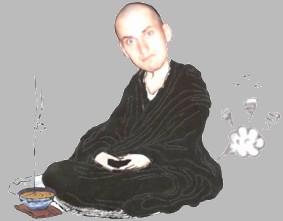 |
|
...After using the shit stick or shit paper, the method for washing your ass is as follows: Holding the bucket in the right hand, dip the left hand well into the water and then, making the left hand into a dipper, scoop up the water. First rinse your dick three times and then wash your ass hole. Make yourself pure and clean using this method... (Shôbôgenzô Senjô) |
|
| August | |
|
"Training" and "practice" (Adult practice - Part IV) |
|---|
So what exactly do I mean with the expression "adult practice"? Before I reflect about the meaning of the word "adult", I would like to say something about "practice". In Japanese, the word is "shugyo", which can be written in two different ways with different characters (which are also pronounced slightly different), and even many Japanese seem not to know the difference between the two. "Shugyo" in Japanese can both mean religious practice (when it is written with a character meaning "going", "doing", "action") - manifesting faith or truth in the actions of one's daily life, and at the same time "training", like the training for a profession for example (in this case the word is written with a character meaning "karma" or "technique"). It goes without saying that the two are completely different. The English word "practice" can also mean something like "training", as for example in "baseball practice". But when I use the word as "adult practice", or when I talk about "zen practice", "practice of the buddha way" etc, I mean "putting something into practice", "manifesting something by actually doing it". Unfortunately, many people seem to understand "zen practice" as "zen training" - training to become something, training to become proficient at something.
This is true for the so called "zen training monasteries" in Japan too. There, people learn how to wear their buddhist robes properly, bow and prostrate in the right way, chant the sutras, etc. They are training to become buddhist priests. They are certainly not practicing buddhism. For them, buddhism is a profession, not a vocation, but it should go without saying that learning how to make money by performing funeral services has nothing to do what the Buddha taught 2500 years ago - how to live our lifes! At Antaiji, we do not train to become buddhist priests. We practice buddhism, which means to live our daily lifes as buddhas and bodhisattvas. This does not mean, though, that we practice to become buddhas and bodhisattvas. We try to manifest buddhas and bodhisattvas - our original nature - in all of the actions of our daily lifes, here and now.
Sometimes, buddhist practice is understood differently: We are deluded beings now, but practicing for countless kalpas as bodhisattvas, we will eventually refine ourselves and finally become buddhas. A deluded being trains to become something "better" - a bodhisattva. A bodhisattva trains to become something even "better" - a buddha. In zen, we do not call this kind of training "practice". Training to become something better is in itself delusion. Endless kalpas of this kind of training won't make us better, we will only sink deeper into delusion. What we call practice in zen means to stop trying to become something, but rather allowing ourselves to be what we originally are - buddhas and bodhisattvas. For this, we have to surrender to the force that transcends our small human egos - the egos that continually say "I want to become better, I want to become buddha". Why is it possible to surrender and practice? It is because we already ARE buddhas, not after surrendering, but already now. Then, why is it so difficult to surrender and practice? Because it does not satisfy our human egos.
Practice does not satisfy us. It is not entertaining at all! But then, what did we expect? How could practice of the buddha dharma be entertaining for our small human minds? Nothing could be less satisfactory and entertaining than the practice of something that does not enlargen our egos. Even when we say that we want to become buddhas or live as bodhisattvas, don't we do so from the stand point of our egos - thinking: "I want to become a buddha, I want to have satori!" Thus, buddhas and bodhisattvas only become an extension of our ego mind - and that is why we are disappointed, because buddhas and bodhisattvas will never reveal themselves in that realm of our ego minds. The life's of buddhas and bodhisattvas are our life, only when we transcend our ego. Making a huge "ego effort" will not make us a buddha. That is what makes buddhism difficult for us. But then, buddhism says that we already ARE buddha in the first place. But we are also human beings, deluded by our egos. First, we need to wake up and see clearly that we are deluded by our egos. Seeing this alone is "big satori". That we are able to realize the fact that we are deluded by our ego is already a proof that we actually are buddhas - otherwise we could not have that realization. But it is not enough to just realize that we are deluded. We also have to proceed and put into practice what is most dissatisfying for our egos.
We are both deluded and buddha, but if we should stop short at saying "we are just ordinary human beings", we will manifest only half of our being. It is such "half human beings" that surf the internet or watch tv shows, always looking for a site or channel that will satisfy them, give them some entertainment. The latest news about the show buziness, politics, sports, women - so called "adult entertainment". We think we are being entertained, but in reality we are just escaping from ourselves - escaping from the realities of our lifes. Only when we switch off the tv, switch off the computer, we will realize how empty our lifes are - just as empty as the screen. And we wake up to the dissatisfactoriness of that life. This is an important realization. This is where real practice starts. This practice is different from trying to satisfy our bored minds. It is different from trying to get "satori" or peace of mind or what so ever. That is why it is so difficult for us - as long as we can not stop our childish mind from whining: "I want candy, I want toys, I want to have satori!" That is why I call this practice "adult practice". It means to stop looking around for fun and satisfaction just like a dog searches for a bone. "Adult practice" means to manifest buddha, to live as a bodhisattva. "Practice" means "to live", "to manifest", while an "adult" is a buddha and bodhisattva. More about this next time.
(Docho)
 |
| Antaiji's Way |
|---|
I had a bit of a realisation recently: I finally realised Antaiji's style - or Muho's style - but it took 4 1/2 months! I was still hoping, or relying, upon people above me to get angry. Of course, our ego doesn't like it when we get yelled at, but I think we realise the long-term benefit of it.
But Muho's not a kindergarten teacher, and Antaiji isn't a place where someone analyses you, shouts at you for your faults, and you become perfect. Antaiji is really a plave where you have to become more aware - of yourself, of your environment, of other people, of the machines you use, everything. and no one else can do it for you.
It's really just an extension of the fundamentals of Buddhism. We are born into the world with the self, we live the self, and we die with the self. There is only the self. Everything exist in relation to this self, and this is true for each self (person). I think this is the way to interpret the Buddha's exclamation: "O Heaven and Earth, I alone am most revered!"
We have only our self, so we can't rely on people to correct our mistakes when we weren't perceptive enough to see them. In short, we can't expect people to wipe our asses for us, as Muho says. We each have to learn to be more aware, more perceptive and wipe our own ass. This is the way of Antaiji.
I read that Uchiyama somewhat modestly used to say to his students: "I am not your teacher, zazen is your true teacher." After sitting in front of the wall for 10 years, then another 10, then another 10, I guess we learn things, but really, I guess we become aware. Wisdom is readiness of mind, the flexibility to adapt to any situation without daydreaming.
Muho said in a recent teisho that the ultimate goal was to have "samadhi" or 100% concentration in everything we do. It seems like a contradiction, because shikantaza isn't meant to have any goals, but I don't think it is. Usually a goal involves separation (myself + goal, now + future) and trying. But 100% concentration is exactly the opposite - no separation, and no trying. Only complete and utter letting go, and awareness of the oneness that was always there, though you were never perceptive enough to notice it before.
(Joel)
 |
| What this moment demands |
|---|
This month I would like to write about an aspect of my practice that has kept me thinking since I arrived here at Antaiji. For this I would like to use quotes from two men who's names and words are always present and - as far as I can judge - of greatest importance at Antaiji.
It started after a week here, when I was skipping through Dogen's Shobogenzo Zuimonki, and I encountered his question: "How deep is your commitment to the Way?" Unfortunately, I forgot the context of Dogen's question, and even though I looked for the question in the text for quite a while, I can not find it again. Anyway, when I read the phrase, it immediately penetrated and got stuck in my mind. After that, during each single period of zazen, this question was with me. When ever I reach my "pain limit", when ever I get nervous or angry, I start to reflect on this question and try to give an answer.
But I also think that this question is not only about the time when we sit in zazen. The question has meaning in all of the 24 hours of the day.
In his commentaries about his master's teaching, Uchiyama Roshi writes about the "zen boom": "We human beings are somehow too lazy to practice. We want to have a taste of practice from a non-involved standpoint of appreciation, like sight-seers. In the same way as spectator sports, which are very popular, the zen boom is a spectator zen boom or a zen sight-seeing boom." These words were written sometime during the sixties, but I think they have lost none of their relevance for today. I do not know if we can still speak of a "zen boom", but what is important here is the relation of Dogen's and Uchiyama's quotes for my and your life.
When I think about Uchiyama's words in the light of Dogen's question, I can't help but reflect on my own practice. Well, I could excuse myself by pointing to the obvious fact that I have been living in a zen monastery now for so and so long, and THAT should be proof enough that I am NOT a zen tourist. But I guess it is not so easy. The proof can be given only in years of steady practice. I think it takes quite some courage to give up the standpoint of the sight-seer and commit oneself completely to the practice of the way.
A practice which in my view is not restricted to Japan or the monastery or anything: Practice just means to be in accord with whatever this single moment demands.
(Thomas)
 |